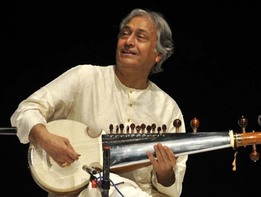
CHICAGO, IL - Sarod maestro Ustad Amjad Ali Khan and his sons, Ayaan and Amaan, will undertake a concert tour of the US through October. The concert and Khan's teaching stint at Stanford is part of what he calls 'the sarod project', an attempt to make more Americans aware of the sarod, a musical instrument, which has so far not been as well known as the sitar, popularized in the West by the likes of Pandit Ravi Shankar.

Khan will be in residency at Stanford in the spring to teach a course, "Classical music-a way of life" "Since my childhood, I always wanted my instrument, the sarod to be able to express the entire range of human emotions...to sing, shout, whisper and cry. It has been a long journey so far and by the benevolence of the heavens, the sarod has become far more expressive than it was 25 years ago. Those moments are a profound reminder of the blessing it is to be in the position of loving-and living-your life's work. Across cultures and faiths, music has always been the pathway to spirituality," Khan said.
Khan said he had a debt of gratitude to his father and guru. "For my father Haafiz Ali Khan, though, there was no question of a life outside music. Life itself was music and music was Life. And so I came to inherit from him the legacy of five generations of musicians as naturally as a bird taking to the air. Referring to the inevitable comparisons with his sons, he said, "I never wanted to create two more Amjad Ali Khans. I gave both Amaan and Ayaan the freedom to develop their musical minds and tastes in the most natural way. Today, I feel that they are both very blessed to have a mind of their own musically and also have their distinctive flavors as artists." Khan said that classical music will thrive under the new generation of musicians, even as the art remains unchanged. "Today we have cell phone, I pods etc, but nobody could create a thirteenth note. These twelve musical notes are the base of every kind of music in the world. In fact music has connected the whole world. We are still struggling on account of religion and power. We need kind and compassionate people in the world and I see classical music as a means to nurture such feelings," he said.
Khan said he had a debt of gratitude to his father and guru. "For my father Haafiz Ali Khan, though, there was no question of a life outside music. Life itself was music and music was Life. And so I came to inherit from him the legacy of five generations of musicians as naturally as a bird taking to the air. Referring to the inevitable comparisons with his sons, he said, "I never wanted to create two more Amjad Ali Khans. I gave both Amaan and Ayaan the freedom to develop their musical minds and tastes in the most natural way. Today, I feel that they are both very blessed to have a mind of their own musically and also have their distinctive flavors as artists." Khan said that classical music will thrive under the new generation of musicians, even as the art remains unchanged. "Today we have cell phone, I pods etc, but nobody could create a thirteenth note. These twelve musical notes are the base of every kind of music in the world. In fact music has connected the whole world. We are still struggling on account of religion and power. We need kind and compassionate people in the world and I see classical music as a means to nurture such feelings," he said.

 RSS Feed
RSS Feed
